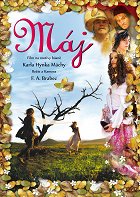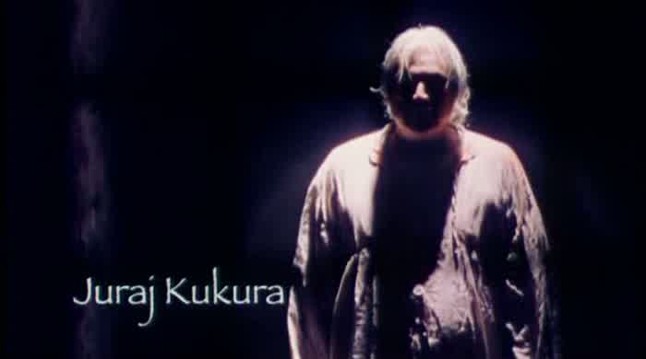Ohjaus:
F. A. BrabecKuvaus:
F. A. BrabecNäyttelijät:
Matěj Stropnický, Sandra Lehnertová, Juraj Kukura, Bronislav Poloczek, Vladimír Javorský, Nina Divíšková, Jan Přeučil, Kryštof Hádek, Jan Tříska (lisää)Juonikuvaukset(1)
An imagery poem in the true sense of the word? Yes! Because this film can only be approached in a single way – using the power of imagery to match the power of the words. Yet we shall not describe with words what a camera can tell via pictures and a film with a story. We shall not repeat notorious facts but even those not familiar with May will clearly see the story is one of love and boundless desire. The story takes place in an unspecified, distant past. But in spite of this unspecific and not very remote “distant past”, the young heroes are more or less contemporary characters. Emotion is a motion, a direction we want to take using all means of expression, in particular imagery. Setting out in this direction, we shall encounter images of my dreams rather than images of my life, hoping that dreams will allow us to transpose the time-tested poem, more than a century old, into a stirring story of undying love and passion… (jakelijan virallinen teksti)
(lisää)Arvostelut (6)
Empty mannerisms of image, superficial crap about metaphysics, the PR campaign around Mácha, Tříska’s beautiful recitation of verses. With the exception of Jan Tříska, the cast is partly miscast, and it is partly a sad situation where there is no one to work with, nothing to work with, and everyone is doing their own thing. It does not surprise me at all that, despite all the fluttering tatters and crosses along the roads, Brabec did not take the film beyond a banal love story. One star for the recitation and constantly uncovered female protagonist.
()
The same applies to the original poem as to its adaptation (yes, Máj represents everything that I hate the most about romanticism). Lehnertová can’t act; luckily she’s silent and undressed most of the time. Stropnický’s terrible lord of the forest is truly terrible. Sixty-two-year-old Kukura is unable to say a single line in a way that it sounds at least a little natural; he knows this and so decides to bury his head in the “sand" for shame (note: the sand is in fact the lap of a girl who could have been his granddaughter). Tříska’s antagonistic expression doesn’t help, but luckily his oratory skills save the day. I simply refuse to comment on the frightful idea with the soundtrack by Support Lesbiens, on the absolute incongruity of the series of shots, on the dream sequences and the “camerawork" - my nerves are in shreds from it.
()
Hynek! Vilém! Jarmila! The music was the best thing about the whole movie. The visual cues could have been better (What's the matter Brabec, are you selling yourself short? Or was this an attempt at "pure art" or something? :) ) But no, it worked, but he should have relied more on Mách, on his verses, that was the driver of all of May. Vilém unconvincing, Jarmila a bimbo who commits suicide all the way at the end (!); why not at the beginning? Anyway, as was already said: "Mr. Director, next time rely more on the subject matter! BUT I commend you for Tříska: it's a good thing he was there, his ‘dead mistress sensibility’ made my day better right away." :-) Hm, but I still would have done it completely differently.
()
The visually captivating concept of Mácha's novel "May," which stands and falls with the perfect balance of colors and moods, becomes a worthy continuation of the hitherto solitary tradition of the adaptation of Erben's novel "A Bouquet" after eight years. Together with the emphasis on the beauty of the landscape, Pecharová's romantic costumes, and Jarmila's physical curves, the film May becomes a visual treat. In terms of the acting, this delight is only supported by the acting aces Kukura, Javorský, and Tříska, while the younger generation is unfortunately made up of one debuting actor after another. This can be summed up as part of an experiment, but one that was much better at incorporating a purely modern musical arrangement.
()
One hour and ten minutes of boredom = seventy minutes of Brabec's visual masturbation, which he was obviously so enthralled by that he simply ignored everything else. We can't even thank the presence of the (otherwise) good actors Tříska, Javorský or Přeučil - they couldn't save this dumbed-down flick with anything (and I have a strong impression that they didn't even try). As for the main roles - Stropnický's "The Ridiculous Lord of the Woods" is an unprecedentedly slimy and disgusting appearance in Czech cinema, Lehnertová's Jarmila is again shown as a first-class... hmmm... prostitute (slut is a strong word, you understand) and Kukura's Schifner - a waste of words, vowels and consonants. The culmination of this work was the music of the band Support Lesbiens - an outrageously disturbing pseudo-rock accompaniment and an overwrought final song, one should also remember the bandits who have been smoking "quality stuff" since they were probably two years old. All these remarkable things confirm that Wild Flowers was a bright exception, and every other Brabec film is to be feared. Seriously.
()
Some works of literature just won’t properly adapt to the screen. Some creators, though, confidently think they can handle those and go ahead. Well, here we are. It’s just a garbage. Karek Hynek Mácha must be rolling over in his grave.
()

